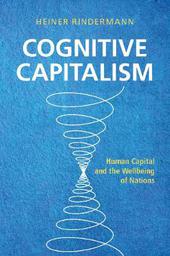
|
Cognitive Capitalism: Human Capital and the Wellbeing of Nations
Paperback / softback
Main Details
| Title |
Cognitive Capitalism: Human Capital and the Wellbeing of Nations
|
| Authors and Contributors |
By (author) Heiner Rindermann
|
| Physical Properties |
| Format:Paperback / softback | | Pages:592 | | Dimensions(mm): Height 227,Width 150 |
|
| Category/Genre | Economics
Development economics |
|---|
| ISBN/Barcode |
9781107651081
|
| Classifications | Dewey:338.9 |
|---|
| Audience | | Professional & Vocational | |
|---|
| Illustrations |
47 Tables, black and white; 32 Halftones, black and white; 25 Line drawings, black and white
|
|
Publishing Details |
| Publisher |
Cambridge University Press
|
| Imprint |
Cambridge University Press
|
| Publication Date |
15 February 2018 |
| Publication Country |
United Kingdom
|
Description
Nations can vary greatly in their wealth, democratic rights and the wellbeing of their citizens. These gaps are often obvious, and by studying the flow of immigration one can easily predict people's wants and needs. But why are there also large differences in the level of education indicating disparities in cognitive ability? How are they related to a country's economic, political and cultural development? Researchers in the paradigms of economics, psychology, sociology, evolution and cultural studies have tried to find answers for these hotly debated issues. In this book, Heiner Rindermann establishes a new model: the emergence of a burgher-civic world, supported by long-term background factors, furthered education and thinking. The burgher-civic world initiated a reciprocal development changing society and culture, resulting in past and present cognitive capital and wealth differences. This is an important text for graduate students and researchers in a wide range of fields, including economics, psychology, sociology and political science, and those working on economic growth, human capital formation and cognitive development.
Author Biography
Heiner Rindermann is Professor of Educational and Developmental Psychology at Technische Universitat Chemnitz, Germany. He has published about 150 articles and books, and is Fellow of the Association for Psychological Science (APS). His research focuses on cognitive human capital from an interdisciplinary perspective, bringing together ideas on cognitive competence, cognitive development, productivity, politics and culture on individual and national levels.
Reviews'In an era where most intelligent people are poorly informed about intelligence, Heiner Rindermann's book is especially welcome. The title of the book effectively summarizes what is most crucial for the economic well-being of a people: Cognitive Capitalism. The author, who grew up in East Germany at a time when the Berlin Wall still stood, is the best-qualified person to integrate intelligence research with the literature on the determinants of economic growth.' Gregory Christainsen, Professor Emeritus, California State University, East Bay 'Cognitive Capitalism is a tour de force of the science of country level differences in cognitive ability. It raises important questions about the role of cognitive ability for culture, health, economics, education, technology, immigration and government. The theory of cognitive capitalism promises to inform our understanding of country level differences just as Darwin's theory informed our understanding of individual differences.' Thomas R. Coyle, University of Texas, San Antonio
|